Why tackling climate change is vital to peace
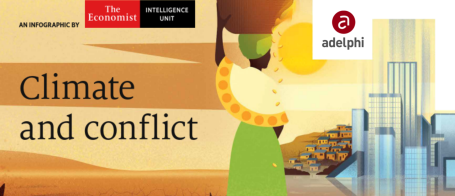
Climate change has resulted in slow-onset changes like gradual temperature increases, rising sea levels, biodiversity loss, ocean acidification, land and forest degradation, and salinisation. The frequency and intensity of extreme weather events are also increasing, including floods, droughts, wildfires and extreme heatwaves.
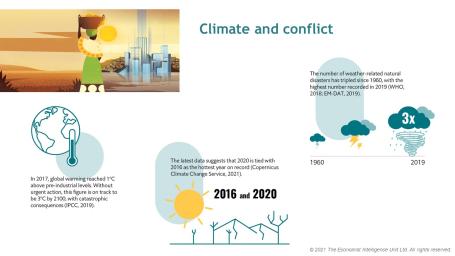
These changes result in social, economic and political fragility. Moreover, stifled crop production, increased poverty, and displacement undermine attempts to implement necessary policy reforms (International Security and Development Center, 2016), resulting in a vicious cycle.
The relationship between climate change, peace and security has implications for all Sustainable Development Goals, particularly:
- SDG 2: Zero Hunger
- SDG 10: Reduced Inequalities (Migration and Displacement)
- SDG 11: Sustainable Cities and Communities
- SDG 8: Decent Work and Economic Growth.
SDG2: ZERO HUNGER
The UN has identified climate change as a leading cause of global hunger. It affects food security as changing temperatures, rainfall variability, and more frequent and intense extreme weather events are straining water supplies and reducing crop yields, and causing food prices to rise and be more volatile (FAO, 2020).
Food insecurity, due in part to higher and volatile food prices, increases competition for resources, aggravates economic grievances, and changes the opportunity costs associated with engaging in conflict (International Security and Development Center, 2016).
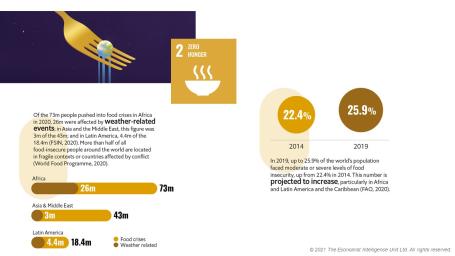
In 2019, up to 25.9% of the world’s population faced moderate or severe levels of food insecurity, up from 22.4% in 2014. This number is projected to increase, particularly in Africa and Latin America and the Caribbean (FAO, 2020).
SDG 10: Reduced Inequalities (Migration and Displacement)
The effects of climate change on food and water availability and crop yields are linked to increases in migration and displacement, as communities – particularly agricultural communities – migrate as an “adaptation strategy” (IEP, 2020).
Migration occurs within countries or across borders into neighbouring countries or regions. Increases in migration and displaced communities can contribute to conflict by fuelling competition for resources and undermining the social balances that exist within and between the communities.
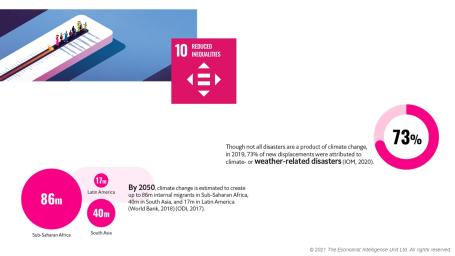
Though not all disasters are a product of climate change, in 2019, 73% of new displacements were attributed to climate- or weather-related disasters (IOM, 2020).
By 2050, climate change is estimated to create up to 86m internal migrants in Sub-Saharan Africa, 40m in South Asia, and 17m in Latin America (World Bank, 2018; ODI, 2017).
SDG 11: Sustainable Cities and Communities
Worsening climate conditions lower rates of agricultural productivity and push rural communities migrate to cities (ADB, 2017).
Growing urban centres usher in the potential for conflict. Sharp increases in the number of people puts pressure on public goods and services, especially in secondary cities that lack the investment and infrastructure needed to sustainably cope with a growing population (EIU Safe Cities Index, 2019).
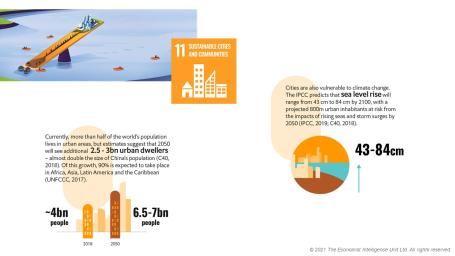
Currently, more than half of the world’s population lives in urban areas, but estimates suggest that 2050 will see additional 2.5 - 3bn urban dwellers – almost double the size of China’s population (C40, 2018). Of this growth, 90% is expected to take place in Africa, Asia, Latin America and the Caribbean (UNFCCC, 2017).
Cities are also vulnerable to climate change. The IPCC predicts that sea level rise will range from 43 cm to 84 cm by 2100, with a projected 800m urban inhabitants at risk from the impacts of rising seas and storm surges by 2050 (IPCC, 2019; C40, 2018).
SDG 8: Economic Growth and Decent Jobs
Climate change undermines inclusive economic growth. It disproportionately affects developing economies and, in particular, poorer communities within these economies (EIU Climate Change Resilience, 2019). This is because poorer-quality infrastructure and housing makes these countries less climate-resilient.
Additionally, developing economies tend to depend heavily on agriculture, a sector which feels the climatic effects of slow-onset changes and extreme weather events particularly acutely (EIU Climate Change Resilience, 2019).
Climate change thereby worsens conditions of poverty, particularly in countries where poverty is already prevalent, further exacerbating their fragility.
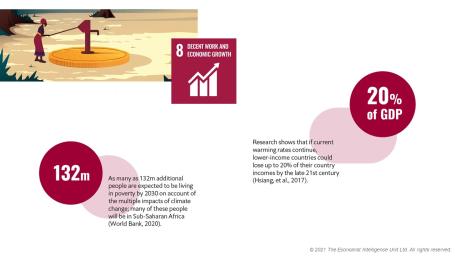
As many as 132m additional people are expected to be living in poverty by 2030 on account of the multiple impacts of climate change; many of these people will be in Sub-Saharan Africa (World Bank, 2020).
Research shows that if current warming rates continue, lower-income countries could lose up to 20% of their country incomes by the late 21st century (Hsiang, et al., 2017).
Conclusion
Climate change disrupts where people live, what they can eat, and how they earn a living. Limiting the warming of the planet also means limiting the number of lives affected by climate-generated fragility and conflict. Effective climate adaptation and building resilience are therefore closely tied to effective peace-building and our progress towards achieving the Sustainable Development Goals.
What we’re doing about it
Weathering Risk is developing a scalable risk assessment approach to identify and respond to climate and security risks. Working hand in hand with key partners across policy and practice, our goal is to enable more effective responses that can weather the risks posed by climate change to sustainable development and peace. The endgame is to enable peaceful and equitable development, ensuring that no one is left behind in the face of a changing climate. Find out more.
[This material was originally published on eiuperspectives.economist.com.]
©️ 2021 The Economist Intelligence Unit Ltd. All rights reserved.
DISCLAIMER: Whilst efforts have been taken to verify the accuracy of this information, neither the Economist Intelligence Unit Ltd. nor its affiliates can accept any responsibility or liability for reliance by any person on this information.
Share on

